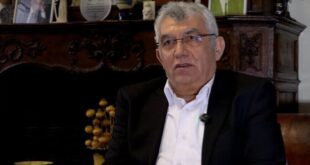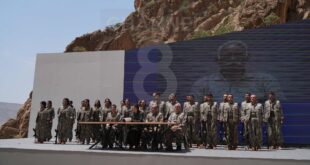The Amsterdam based Foundation for Literature gave Kurdish poet and translator Kawa Nemir a chance to catch his breath after arriving in the Netherlands from Turkey, where he was under increasing political pressure; Nemir became a writer in residence in the foundation’s program ‘Refuge City’. But Nemir is not the kind of man to catch his breath: he has been working hard ever since he landed in Amsterdam four months ago. ‘I am like a guerrilla’, he says in a cafe in a side street of one of Amsterdam’s famous historic canals. ‘I take my task very seriously and I never quit.’ The task ahead: publish hundreds of books in Kurdish, both Kurdish and international classics. Now that publishing in Kurdish in Turkey had become close to impossible, Nemir is aiming to make Amsterdam a hub for literature in Kurdish.
In the hours before the interview Kawa Nemir was a guest in an Arabic bookstore in Amsterdam that organizes events with writers, poets and translators from the Middle-East, many of whom have arrived in the Netherlands since the Syrian war. He is about to finish his Kurdish translation of James Joyce’s classic Ulysses and was on stage with a Dutch translator of Joyce. Together, they declaimed parts of the work in their respective mother tongues and talked about the hardships but mostly the joys of translating Joyce.
For Nemir, translating Ulysses touched directly upon the struggle with his mother tongue, the Kurdish dialect Kurmanji. During the bookshop event, he told the public that when he started as a translator, more than 20 years ago, it was a way for him to learn his own language better. ‘In Turkey’, he explained, ‘Kurdish is forbidden and we cannot learn it in school. My first Kurmanji teacher was my mother. While I was translating she helped me find the right words, the right slang, the right expressions.’
He has translated over 100 books now, of which 28 have been published, among them several works of Shakespeare and other classics. Surprisingly, he said it is not potential readers that he translates for, but for Kurdish writers: ‘I give writers words. By translating, I expand the Kurdish syntax. Many structures and words I use are put to paper in Kurdish for the first time. This is important in preserving the language. Of course, we need proper education in Kurdish in schools in Turkey, but we cannot wait for that. I have a responsibility.’ He added: ‘You know, James Joyce and Shakespeare are not easy to translate but I do it also because I want to use the full potential of my mother tongue.’
Kawa Nemir was born in 1974 to a well-off family in the eastern province of Iğdır. As a child, he moved to Istanbul with his family and got a degree in English literature. Some 15 years ago, he moved to Diyarbakir, the biggest province in the Kurdish southeast of Turkey. Because there were few political obstacles to publishing in Kurdish at the time, he and a few others started the Lîs publishing house. It was aimed at republishing Kurdish classics, as well as ones that had before only been available in Arabic script, and translations of international classics. Together with two other publishers – Avesta, which focuses mostly on original Kurdish books, and Aram, which publishes works by Kurdish political prisoners and Kurdistan Workers’ Party (PKK) fighters – they made the Kurdish book market thrive. Their publications were not only sold in the southeast, but in Ankara, Istanbul, Adana, Izmir and elsewhere too.
One of Nemir’s most successful projects was the Kurdish translation of Hamlet, which was put on stage by Dutch theatre group Rast and the Diyarbakir municipal theatre in 2012 and 2013. The troop toured for months in Kurdistan, Turkey and Europe, staging the play more than 120 times.
But then, in 2015, the blooming days of Kurdish publishing came to an abrupt halt. In the autumn of that year, in several cities in the south-east, wars started between the Turkish army and the YPS, an armed group of young people affiliated with the PKK, a party with Marxist-Leninist roots, was created in 1978 in response to an denial of Kurdish rights in the Turkish republic.
The wars raged on until the spring of 2016. Nemir’s city Diyarbakir was affected heavily: most of the historical heart of the city was destroyed and many residents, both fighters and civilians, died. Nemir said he knew several of the fighters: ‘Some of them studied Kurdish language at the university. They used to come to my home library, I helped them with translations and edited their work. Maybe one of them could have been a great poet. But they died.’
It took him back to the 1990s, when he himself faced the choice of ‘going to the mountains’ or not. ‘Many people I knew died. I decided to stay in the city.’
Before the city wars, people used to visit the premises of Lîs – Kurmanci for ‘nest’, and the name of a flower in another Kurdish dialect – to buy books. Readers began to visit less frequently. ”They were intimidated by the state,” Nemir said. ”One day, a young teacher came to us. She had bought many books in the previous years. She came to give them all back. A judicial investigation had been opened against her for political reasons. She was afraid that Kurdish books found in a possible house raid would be used against her.’’
The failed coup attempt in July 2016 only worsened the situation. People suspected of having ties to either the coup plotters or the armed or nationalist political Kurdish movement were at risk of being arrested or fired from their jobs. Having Kurdish books at home or being seen at a Kurdish publishing house became risky. Unlike Aram publishing house, Lîs was not repeatedly raided, nor were books confiscated, but there was intimidation, including against Nemir personally, often by plain clothes policemen on the street. Publishing and translation projects grinded to a halt when the Turkish businessman, social activist and philanthropist Osman Kavala was arrested, in October 2017. With him in jail, contacts with many NGO’s in Europe that had funded Lîs’ work ceased to exist.
But leave Kurdistan? Kawa Nemir never wanted that. He moved to Mardin, an hour south of Diyarbakir, to find some peace and quiet to try to keep working. But he couldn’t. There was no work. And like many people, he never slept well, always on guard for a possible police raid at 5 in the morning. The raid came, not to his house, but to two students living above him.
‘The police smashed their front door even though they shouted that they would open. I opened my door to see if I could help but looked into the barrel of a machine gun. Police shouted at me that I had to get back and close the door. I did,’ Nemir explained.
He knew it was time to go. He packed some treasured books and T-shirts in a suitcase and caught a plane to Istanbul, where the Dutch consulate gave him a tourist visa. ‘I do not want to end up in jail. Nobody wants that, but I cannot do my work in prison. Like I said, I am disciplined. I have to work. I have to contribute.’
With Kurdish friends in Amsterdam he started a new foundation, named after the famous 17th century Kurdish poet Ehmedê Xani. If the work can no longer be done from Kurdistan, then Amsterdam will be the centre of Kurdish publishing. Fund raising has started, contacts with translators all over the world are being set up and Nemir paid a visit to a Middle-Eastern languages institute in Paris, affiliated with Sorbonne University, to find students who want to invest time, translate and learn. He extended his Dutch visa. After the refuge that the Foundation for Literature in cooperation with Anne Frank Foundation offered him, he hopes to receive a scholarship at another foundation to help him stay in the Netherlands.
Nemir’s extensive library is still in his apartment in Mardin, for which he continues to pay his rent. Friends keep things in order and make sure some books he misses or needs reach him via friends who travel. He said: ‘I can’t speak Kurdish here every day. I miss it. I read the books and recite them out loud or in my heart.’
Source: ahvalnews.com
 Infowelat Enformasyon Ji Bo Welat
Infowelat Enformasyon Ji Bo Welat




